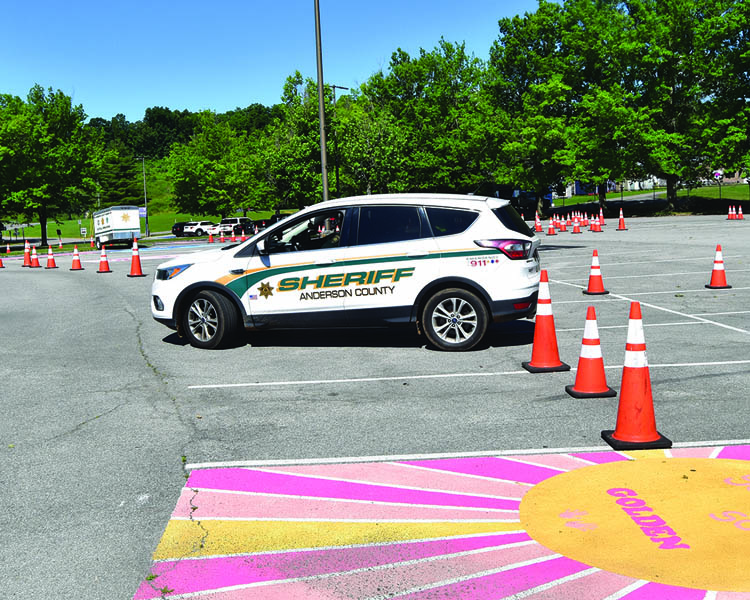ACSO deputies train to drive safely

Anderson County Sheriff’s Office Sgt. Lincoln B. Steele trained deputies in how to back up and turn around on narrow roads using a course at Anderson County High School. (photo:Ben Pounds )
Anderson County Sheriff’s Office Deputies practiced driving and backing up through a course with cones Tuesday, June 11 at Anderson County High School. Drivers taking the training included patrol deputies, jail transport, administrative officers, reserve deputies, detectives and criminal investigation division, all using the same vehicles they use on the job. The cones simulated narrow back roads and helped the drivers practice backing up and turning around on the.
Sgt. Lincoln B. Steele led the training and said a total of 140 ACSO deputies have driven the course this year. He said it’s required for deputies who use county owned vehicles with blue lights and sirens. Fire departments, rescue squads, Emergency Medical Services ambulance drivers and the Clinton Police Department use similar driving courses.
“This course is for the county roads we’ve got. A lot of roads are smaller,” he said, adding the ACSO sets up the courses “so that everyone can be more familiar with what the tolerance and what their capabilities are as far as moving their assigned patrol vehicle.”
Patrol officers, he said, especially benefit from this exercise because they need to know how to turn around if an incident calls for it. He said it also helps the deputies avoid collisions.
The state of Tennessee, he said, passed the Vanessa K. Free Act in 2005, requiring at least two hours of training for emergency vehicle drivers. A police vehicle hit University of Tennessee Chattanooga student Vanessa K. Free and killed her in 2005, inspiring the bill.
ACSO’s deputies do most of their training in classrooms for two hours, going over state and local policies on pursuits and vehicle dynamics. Given the types of roads and driving involved, Steele said the deputies also learn they need to make sure their tires are inflated to the proper level.
“It’s mainly to be aware of civilian drivers,” said Steele regarding the classroom training, adding that civilians can easily miss emergency vehicles approaching. “Especially this day, most of your cars are so airtight that you can have an ambulance pass by you with the siren on and you won’t hear it because they’re so tight and their stereos,” he said.
While the classroom training is annual, the deputies do the course training every other year.
Steele said the ACSO had been “fairly fortunate” at avoiding collisions. Deer and wet pavement were common causes of the ones that did occur. Narrow areas, as simulated on the course were another.
“With the confined area that we’ve got right here, they can still go through it quick, but there’s still enough obstacles and exercises to know that they can still work on their braking and being able to keep their vehicle under control,” he said.

